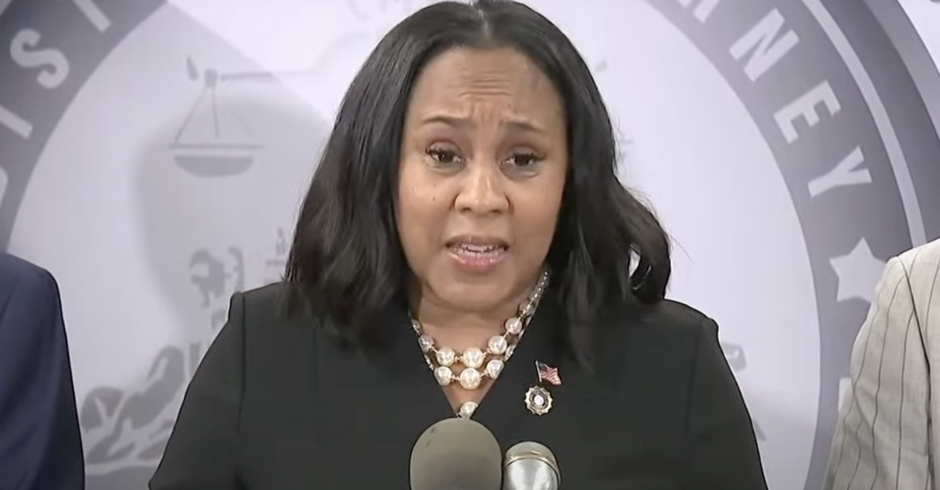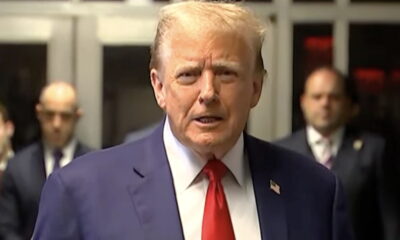READ: Here’s the (Laughable) Memo Trump Just Signed Authorizing His Ban of Transgender Service Members
Trump Using Debunked Arguments Claiming Military Effectiveness and Lethality and Unit Cohesion Will Suffer
The White House early Friday evening released the memo President Donald Trump signed authorizing the Pentagon and Homeland Security to discharge transgender service members. In briefing reporters the White House highlighted three major points: First, the ban must be implemented by March of 2018, with decisions complete by January. Second, the ban includes an immediate halt to paying for all transgender transition related medical expenses. Third, it allows the Defense Secretary to use various factors to determine which transgender service members should be removed from the armed forces, and which, if any, should be allowed to stay.
RELATED: BREAKING – Trump Signs Memo Giving Pentagon Authority to Discharge Transgender Service Members
Below is the full text of the memo. But allow me to highlight a ludicrous passage first:
“In my judgment,” Trump’s memo states, “the previous Administration failed to identify a sufficient basis to conclude that terminating the Departments’ longstanding policy and practice” of not allowing open service by transgender service members “would not hinder military effectiveness and lethality, disrupt unit cohesion, or tax military resources, and there remain meaningful concerns that further study is needed to ensure that continued implementation of last year’s policy change would not have those negative effects.”
Trump is literally using the debunked talking points of the far right when they fought the repeal of “Don’t Ask, Don’t Tell.”Â
Studies show they are not credible, which will only make the lawsuits that have been and are about to be filed even easier to win.
“Military effectiveness and lethality” and “unit cohesion” are all straw man arguments that the Trump administration cannot support in a court of law.
Below is the full text of the memo, via the White House. (For ease of reading we are not block quoting.):
Â
MEMORANDUM FOR THE SECRETARY OF DEFENSE
               THE SECRETARY OF HOMELAND SECURITY
Â
SUBJECT:Â Â Â Â Â Â Â Military Service by Transgender Individuals
     Section 1.  Policy. (a) Until June 2016, the Department of Defense (DoD) and the Department of Homeland Security (DHS) (collectively, the Departments) generally prohibited openly transgender individuals from accession into the United States military and authorized the discharge of such individuals. Shortly before President Obama left office, however, his Administration dismantled the Departments’ established framework by permitting transgender individuals to serve openly in the military, authorizing the use of the Departments’ resources to fund sex-reassignment surgical procedures, and permitting accession of such individuals after July 1, 2017. The Secretary of Defense and the Secretary of Homeland Security have since extended the deadline to alter the currently effective accession policy to January 1, 2018, while the Departments continue to study the issue.
Â
    In my judgment, the previous Administration failed to identify a sufficient basis to conclude that terminating the Departments’ longstanding policy and practice would not hinder military effectiveness and lethality, disrupt unit cohesion, or tax military resources, and there remain meaningful concerns that further study is needed to ensure that continued implementation of last year’s policy change would not have those negative effects.
Â
    (b) Accordingly, by the authority vested in me as President and as Commander in Chief of the Armed Forces of the United States under the Constitution and the laws of the United States of America, including Article II of the Constitution, I am directing the Secretary of Defense, and the Secretary of Homeland Security with respect to the U.S. Coast Guard, to return to the longstanding policy and practice on military service by transgender individuals that was in place prior to June 2016 until such time as a sufficient basis exists upon which to conclude that terminating that policy and practice would not have the negative effects discussed above. The Secretary of Defense, after consulting with the Secretary of Homeland Security, may advise me at any time, in writing, that a change to this policy is warranted.
Â
     Sec. 2.  Directives. The Secretary of Defense, and the Secretary of Homeland Security with respect to the U.S. Coast Guard, shall:
Â
    (a) maintain the currently effective policy regarding accession of transgender individuals into military service beyond January 1, 2018, until such time as the Secretary of Defense, after consulting with the Secretary of Homeland Security, provides a recommendation to the contrary that I find convincing; and
Â
    (b) halt all use of DoD or DHS resources to fund sex‑reassignment surgical procedures for military personnel, except to the extent necessary to protect the health of an individual who has already begun a course of treatment to reassign his or her sex.
Â
     Sec. 3.  Effective Dates and Implementation. Section 2(a) of this memorandum shall take effect on January 1, 2018. Sections 1(b) and 2(b) of this memorandum shall take effect on March 23, 2018. By February 21, 2018, the Secretary of Defense, in consultation with the Secretary of Homeland Security, shall submit to me a plan for implementing both the general policy set forth in section 1(b) of this memorandum and the specific directives set forth in section 2 of this memorandum. The implementation plan shall adhere to the determinations of the Secretary of Defense, made in consultation with the Secretary of Homeland Security, as to what steps are appropriate and consistent with military effectiveness and lethality, budgetary constraints, and applicable law. As part of the implementation plan, the Secretary of Defense, in consultation with the Secretary of Homeland Security, shall determine how to address transgender individuals currently serving in the United States military. Until the Secretary has made that determination, no action may be taken against such individuals under the policy set forth in section 1(b) of this memorandum.
Â
     Sec. 4.  Severability. If any provision of this memorandum, or the application of any provision of this memorandum, is held to be invalid, the remainder of this memorandum and other dissimilar applications of the provision shall not be affected.
Â
     Sec. 5.  General Provisions. (a) Nothing in this memorandum shall be construed to impair or otherwise affect:
Â
          (i)  the authority granted by law to an executive department or agency, or the head thereof; or
Â
          (ii) the functions of the Director of the Office of Management and Budget relating to budgetary, administrative, or legislative proposals.
Â
    (b) This memorandum shall be implemented consistent with applicable law and subject to the availability of appropriations.
Â
    (c) This memorandum is not intended to, and does not, create any right or benefit, substantive or procedural, enforceable at law or in equity by any party against the United States, its departments, agencies, or entities, its officers, employees, or agents, or any other person.
Â
    (d) The Secretary of Defense is authorized and directed to publish this memorandum in the Federal Register.
Â
Â
Â
                               DONALD J. TRUMP
###
Â
To comment on this article and other NCRM content, visit our Facebook page.
Image by Ted Eytan via Flickr and a CC licenseÂ

Enjoy this piece?
… then let us make a small request. The New Civil Rights Movement depends on readers like you to meet our ongoing expenses and continue producing quality progressive journalism. Three Silicon Valley giants consume 70 percent of all online advertising dollars, so we need your help to continue doing what we do.
NCRM is independent. You won’t find mainstream media bias here. From unflinching coverage of religious extremism, to spotlighting efforts to roll back our rights, NCRM continues to speak truth to power. America needs independent voices like NCRM to be sure no one is forgotten.
Every reader contribution, whatever the amount, makes a tremendous difference. Help ensure NCRM remains independent long into the future. Support progressive journalism with a one-time contribution to NCRM, or click here to become a subscriber. Thank you. Click here to donate by check.
 |




















